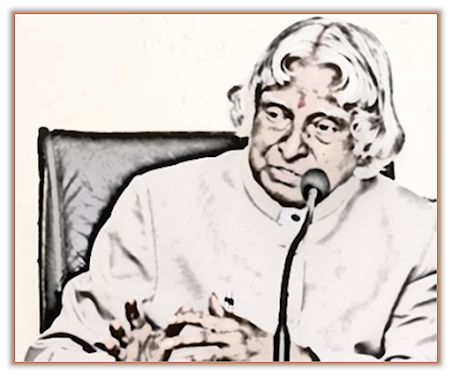Early Life and Education:
Dr. Avul Pakir Jainulabdeen Abdul Kalam, born on October 15, 1931, in Rameswaram, Tamil Nadu, India, hailed from a modest Tamil Muslim family. His father, Jainulabdeen, was a boat owner, and his mother, Ashiamma, was a housewife. Kalam's early life was shaped by the values of humility, hard work, and an insatiable curiosity.
Growing up in Rameswaram, a small town with a close-knit community, young Kalam was known for his diligence and dedication to education. He attended the Schwartz Higher Secondary School, where he exhibited a keen interest in mathematics and science. His teachers recognized his exceptional talent and encouraged him to pursue higher education.
Kalam's journey continued at St. Joseph's College, Tiruchirappalli, where he studied physics. While he was an earnest student, it was during these years that he faced his first significant setback—a dream-shattering rejection from the Indian Air Force. Undeterred by this failure, Kalam redirected his ambitions toward aeronautics and space, setting the stage for a remarkable journey of resilience.
Facing Failure:
The rejection from the Indian Air Force was a turning point for Kalam, a moment that could have defined his future negatively. However, instead of succumbing to disappointment, he chose to learn from the setback. The failure fueled his determination to excel in his chosen field, and he redirected his focus towards a career in aerospace engineering.
Kalam's journey to success was not devoid of challenges. Financial constraints loomed large, and he had to take up odd jobs to support his education. Yet, he persisted. His time at the Madras Institute of Technology (MIT) was marked by hard work, determination, and a passion for learning. It was here that he immersed himself in the world of aeronautics, laying the foundation for his groundbreaking contributions to India's space and defense capabilities.
Achieving Success:
As Kalam delved deeper into aerospace engineering, his brilliance and dedication became evident. He graduated from MIT in 1958 and joined the Defense Research and Development Organisation (DRDO). His trajectory toward success gained momentum when he became involved in India's space program.
In the early 1970s, Kalam played a pivotal role in India's space endeavors, particularly in the development of the Satellite Launch Vehicle (SLV) and the successful launch of the Rohini satellite. These achievements catapulted India into the league of nations capable of satellite launch capabilities.
However, Kalam's most significant success came in the realm of defense technology. As the Project Director of India's Integrated Guided Missile Development Program (IGMDP), he led the development of the Agni and Prithvi missiles, showcasing India's prowess in ballistic missile technology. His efforts earned him the moniker "Missile Man of India," symbolizing his role in advancing the country's defense capabilities.
In 1998, India conducted a series of nuclear tests, demonstrating its nuclear capabilities to the world. Kalam, by then the Chief Scientific Advisor to the Prime Minister, played a key role in this historic event. The success of the nuclear tests solidified India's position on the global stage and underscored Kalam's role as a visionary scientist and leader.
Presidency and Beyond:
The pinnacle of Kalam's career came in 2002 when he was elected as the 11th President of India. His presidency marked a departure from traditional ceremonial roles, as Kalam continued to engage with students and young minds, inspiring them to dream big and pursue excellence. His presidency was characterized by a focus on education, youth empowerment, and fostering a scientific temperament in society.
Post-presidency, Kalam remained an influential figure through his writings, speeches, and interactions. His autobiography, "Wings of Fire," became a bestseller, offering insights into his life and the principles that guided him. Kalam's vision extended beyond national borders, and he became a global advocate for science, technology, and education.
Legacy and Contributions to the World:
Dr. A.P.J. Abdul Kalam's contributions transcended national boundaries. His emphasis on education, innovation, and the power of youth resonated not only in India but around the world. Kalam believed that knowledge and technology could be powerful agents for positive change and international cooperation.
In the realm of space exploration, Kalam's contributions laid the foundation for India's continued progress. The Indian Space Research Organisation (ISRO), building on the groundwork laid by Kalam, achieved remarkable milestones, including Mars Orbiter Mission (Mangalyaan) in 2014, showcasing India's capabilities in space exploration.
Kalam's advocacy for sustainable development, renewable energy, and environmental consciousness showcased his forward-looking approach. He envisioned a world where science and technology could be harnessed for the greater good, addressing global challenges such as poverty, hunger, and climate change.
Beyond his professional achievements, Kalam's simplicity, humility, and accessibility endeared him to people from all walks of life. His ability to connect with students, encourage their dreams, and impart wisdom made him a beloved figure, earning him the affectionate title of the "People's President."
Dr. A.P.J. Abdul Kalam left an indelible mark on India and the world. His legacy lives on in the hearts and minds of countless individuals who continue to be inspired by his journey—from a small town in Rameswaram to becoming a globally revered scientist, leader, and visionary. The story of Abdul Kalam is a testament to the power of resilience, the pursuit of knowledge, and the potential of an individual to make a lasting impact on the world.


No comments:
Post a Comment